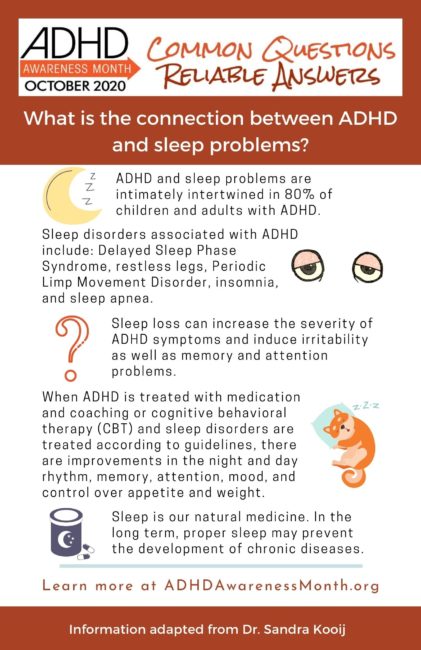Is ADHD a sleep disorder?
ADHD and sleep problems are intimately intertwined in the majority of children as well as adults. The sleep problems usually also start in early childhood. Most people have difficulty falling asleep on time, in children described as ‘bedtime resistance’ and adults are called ‘evening types’ or ‘night owls’. This circadian rhythm disorder, or Delayed Sleep Phase Syndrome is associated with a delayed onset of the sleep hormone melatonin, as was objectively measured in saliva (van Veen 2010). ADHD itself is associated with a dysregulation of the neurotransmitter dopamine, which is typically produced during daytime. So disturbances in the rhythm of day and night seem implicated in ADHD. Which leads to the question: could ADHD (also) be a sleep disorder?? (Bijlenga 2019). We are testing this hypothesis in our research. If this is true, treatment of the delayed rhythm may improve ADHD symptoms, leading to a new perspective in the treatment of ADHD.
Besides the delayed sleep rhythm, there are several other sleep disorders associated with ADHD: Restless Legs (restlessness before falling asleep)/Periodic Limp Movement Disorder (restlessness during sleep), Insomnia (arousal, worrying in bed) and Sleep Apnea (sleep breathing disorder) (Vogel 2017; Wynchank 2016, 2017). Some people with ADHD even have several sleep disorders. If disturbed sleep is not treated, the treatment of ADHD will be suboptimal due to sleep loss, that induces memory & attention problems and irritability.
Treatment of sleep and ADHD
Every sleep disorder has its own specified treatment:
Delayed sleep is treated by ‘Chronotherapy’ consisting of
- sleep hygiene measures (no screens at night, or wearing orange goggles to protect the eyes from the blue light, no caffeine at night, shower before bedtime, and many more)
- Melatonin in the evening, and
- Light therapy in the early morning (7-8 am). This combination is an effective way to reset the late sleep rhythm in a few weeks. Only sleep hygiene is usually insufficient.
Insomnia is effectively treated by a special Cognitive Behavior therapy for Insomnia (CGT-I).
Restless legs by supplementing ferritin levels if too low, and medication.
Sleep apnea by diet (often in obese people), prevention of supine position, devices in the mouth to advance the jaw or tongue, and CPAP (Continuous Positive Airway Pressure).
Knowledge about sleep disorders is increasing, but treatment is not always available in psychiatry or at the GP. When ADHD is treated with medication and coaching or CBT, and the sleep disorder according to the guidelines, the rhythm of night and day, memory, attention and mood improve, as well as control over appetite and weight. In the long term, this may prevent the development of chronic diseases.
Sleep is our natural medicine.
About the Author

Prof. Dr. J.J. Sandra Kooij is a psychiatrist and researcher specialized in ADHD and sleep in adults. She is affiliated with Amsterdam University Medical Center/VUmc and PsyQ, psycho-medical programs in the Hague, the Netherlands.
References
A clarifying easy read is the book Why We Sleep by Matthew Walker.


Hi,
I can relate to a lot of the symptoms listed. One thing I didn’t see is how habitual tardiness, or no concept of time is related to ADD, or ADHD in adults. According to my psychiatrist my ADD is directly linked to my habitual tardiness, and or no concept of time. Is it possible to touch on this subject? I’d like to get a better understanding, and the reasons why I’ve been this way from childhood all the way into adulthood. This has had many negative effects in all aspects of my life.